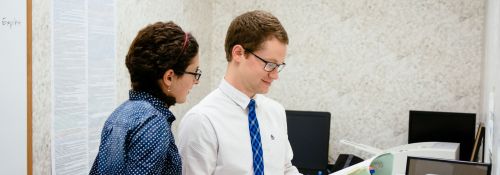
Studying a Statesman: Churchill Fellows Assist with Winston Churchill Biography
The most recent volume of the official biography of Winston Churchill—the work of Hillsdale College’s Churchill Project—is 2,470 pages long and is printed on the thinnest grade of paper besides Bible paper, but covers only eight months of history. It is the 18th document volume of the bibliography, corresponding to one of the already-published eight narrative volumes.
The Churchill Fellows Program offers undergraduate and graduate students the opportunity to aid in the compilation of the official biography.
Soren Geiger, ’13, the director of the program and research assistant to President Larry Arnn, says that the fellowship provides students more than the opportunity to work on the biography, however. “The fellowship also gives nine undergraduate and graduate students an education in statesmanship focusing on the legacy of Winston Churchill,” he says.
Student fellows work on various aspects of the biography and help manage the project website. The documents came from the home of Sir Martin Gilbert, who was the official biographer of Winston Churchill for 44 years. President Arnn and his now-wife Penny also worked on compiling and copying these same documents from the archives when they were in college.
“Churchill’s political career was more than 50 years long,” Geiger says. “He left everyone who came after him the largest collection of personal papers of any statesman of his stature ever. And we have that.”
According to Geiger, there are currently 26 volumes—eight completed narrative volumes and 18 document volumes. He and his staff are working on six more document volumes, which include everything from letters to speeches. Geiger hopes to complete the process by June 2018. He also says that the program will soon release the volumes as e-books. “For the first time, millions of Churchill’s words will be searchable by the touch of a finger,” he says.
Fellow Lillian Quinones, ’17, has been working on recording the volumes to e-books. “To portray the life of a man who is so inspiring is a very exciting opportunity,” she says.
Quinones says that she has learned much through her work on the project, and she is excited to take part in a project with an enduring legacy. Besides learning practical skills—such as how to write footnotes—Quinones notes that it is important to keep history alive and to learn from it.
“Learning from the past is something that we must do with humility,” she says. “Churchill came at a very important time in history. It’s exciting to see the interchange and spirit of the times through his correspondence, and that’s really what the documents are serving.”
Geiger echoes the importance of the work for the College and the rich wisdom found in the Churchill documents.
“All the stars aligned to allow us to make great use out of his thoughts and writings, to demonstrate how a statesman actually leads, and to show how these ideas and principles work themselves out in policy,” he says.
Printed in the Spring 2016 Alumni Magazine